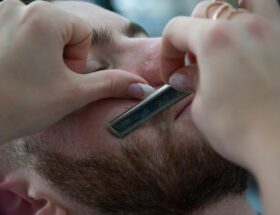Maintaining sisterlocks is essential to ensure they remain healthy and neat. One common question is, should I braid my sisterlocks every night?
Yes, braiding your sisterlocks every night offers several advantages, contributing to the overall health and appearance of your locs. Read on!
Why You Should Braid Your Sisterlocks Every Night
Frizz Control
Sisterlocks are prone to frizz due to their tightly coiled structure. Therefore, braiding your sisterlocks before bedtime can help control and minimize frizz.
Prevent Tangling
Braiding your sisterlocks before bed helps prevent tangling by keeping each strand separated and in its place. As such, it reduces the risk of breakage and simplifies the detangling process in the morning.
Promote Hair Growth
Gentle braiding increases blood circulation to the scalp, leading to healthier hair follicles and, ultimately, increased hair growth. Further, regular braiding minimizes hair breakage, allowing your locs to grow longer and stronger.
Maintain the Neat Look
If you want your sisterlocks to look neat and well-maintained, nightly braiding is crucial. This routine ensures that your locs stay in place and retain their uniform shape, contributing to a polished and professional appearance.
To Protect the Ends
Braiding your sisterlocks every night protects the delicate ends, preventing them from rubbing against clothing or bedding, which can cause damage and split ends.
Versatility
By braiding them every night, you prepare your locs for creative hairstyles the next day. Whether you want to create intricate updos or elegant braided styles, well-braided sisterlocks provide a solid foundation for your styling adventures.
Despite these benefits, many advise against braiding daily for the following reasons.
Drawbacks of Nightly Braiding
Braiding your sisterlocks every night can lead to over-manipulation, which might cause damage to your hair over time. On top of that, constantly twisting or braiding your locks can weaken them and make them more susceptible to breakage.
Nightly braiding can be time-consuming, and not everyone has the time or patience to dedicate to this routine. It might not be practical for individuals with busy lifestyles.
In addition, some people find that sleeping with their hair in braids is uncomfortable, especially if the braids are tight or cause tension on the scalp.
Alternative Hair Care Strategies to Consider
If nightly braiding doesn’t align with your lifestyle or hair care goals, there are alternative strategies to consider:
Loose Braiding
If you still want the benefits of braiding but want to minimize manipulation, you can loosely braid your sisterlocks or use larger sections to reduce tension and potential damage.
Protective Styles
Consider protective styles like buns, twists, or updos that can help protect your sisterlocks and reduce friction while you sleep.
Conclusion
Your hair care goals, lifestyle, and personal preferences influence the decision to braid your sisterlocks every night. While nightly braiding can offer benefits like tangle prevention and consistent styling, it may not be suitable for everyone due to its time-consuming nature and potential drawbacks.
Hence, consider alternative hair care strategies, like protective styles, to keep your sisterlocks healthy and well-maintained without the need for nightly braiding. Always consult a professional stylist for personalized advice on caring for your sisterlocks.
Popular Questions about Sisterlocks
How often should I braid my sisterlocks at night?
Braiding your sisterlocks every night is a good practice, but it may not be necessary for everyone. Some individuals may find that every other night or a few times a week suffices to maintain their locs.
Can I use any braiding style for sisterlocks?
While traditional three-strand braids work well for sisterlocks, many individuals opt for two-strand twists or other styles that are comfortable and effective for their hair.
Are there specific products I should use for nightly braiding?
Using a lightweight hair oil or a moisturizing spray before braiding can help keep your sisterlocks supple and minimize breakage. Be sure to choose products suitable for your hair type and needs.
What should I do if I notice breakage or thinning in my sisterlocks?
Assess the cause and take corrective action. Also, consult a professional sisterlocks consultant to determine the underlying issue and get advice on how to care for and repair your locs.










